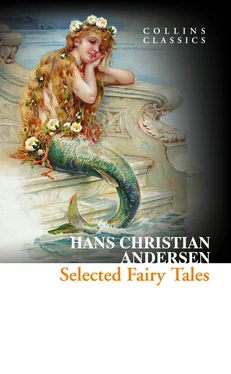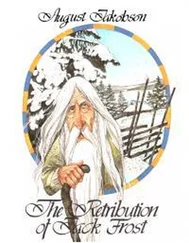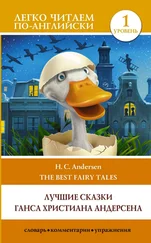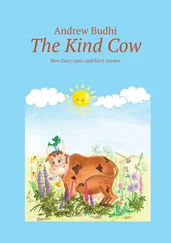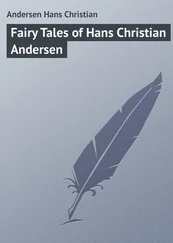Oh, what a number of things Rudy had to carry over the mountains, when he set out to return home! He had three silver cups, two handsome pistols, and a silver coffee-pot. This latter would be useful when he began housekeeping. But all these were not the heaviest weight he had to bear; something mightier and more important he carried with him in his heart, over the high mountains, as he journeyed homeward.
The weather was dismally dark, and inclined to rain; the clouds hung low, like a mourning veil on the tops of the mountains, and shrouded their glittering peaks. In the woods could be heard the sound of the axe and the heavy fall of the trunks of the trees, as they rolled down the slopes of the mountains. When seen from the heights, the trunks of these trees looked like slender stems; but on a nearer inspection they were found to be large and strong enough for the masts of a ship. The river murmured monotonously, the wind whistled, and the clouds sailed along hurriedly.
Suddenly there appeared, close by Rudy’s side, a young maiden; he had not noticed her till she came quite near to him. She was also going to ascend the mountain. The maiden’s eyes shone with an unearthly power, which obliged you to look into them; they were strange eyes,—clear, deep, and unfathomable.
“Hast thou a lover?” asked Rudy; all his thoughts were naturally on love just then.
“I have none,” answered the maiden, with a laugh; it was as if she had not spoken the truth.
“Do not let us go such a long way round,” said she. “We must keep to the left; it is much shorter.”
“Ah, yes,” he replied; “and fall into some crevasse. Do you pretend to be a guide, and not know the road better than that?”
“I know every step of the way,” said she; “and my thoughts are collected, while yours are down in the valley yonder. We should think of the Ice Maiden while we are up here; men say she is not kind to their race.”
“I fear her not,” said Rudy. “She could not keep me when I was a child; I will not give myself up to her now I am a man.”
Darkness came on, the rain fell, and then it began to snow, and the whiteness dazzled the eyes.
“Give me your hand,” said the maiden; “I will help you to mount.” And he felt the touch of her icy fingers.
“You help me,” cried Rudy; “I do not yet require a woman to help me to climb.” And he stepped quickly forwards away from her.
The drifting snow-shower fell like a veil between them, the wind whistled, and behind him he could hear the maiden laughing and singing, and the sound was most strange to hear.
“It certainly must be a spectre or a servant of the Ice Maiden,” thought Rudy, who had heard such things talked about when he was a little boy, and had stayed all night on the mountain with the guides.
The snow fell thicker than ever, the clouds lay beneath him; he looked back, there was no one to be seen, but he heard sounds of mocking laughter, which were not those of a human voice.
When Rudy at length reached the highest part of the mountain, where the path led down to the valley of the Rhone, the snow had ceased, and in the clear heavens he saw two bright stars twinkling. They reminded him of Babette and of himself, and of his future happiness, and his heart glowed at the thought.
VI. The Visit to the Mill
“What beautiful things you have brought home!” said his old foster-mother; and her strange-looking eagle-eyes sparkled, while she wriggled and twisted her skinny neck more quickly and strangely than ever. “You have brought good luck with you, Rudy. I must give you a kiss, my dear boy.”
Rudy allowed himself to be kissed; but it could be seen by his countenance that he only endured the infliction as a homely duty.
“How handsome you are, Rudy!” said the old woman.
“Don’t flatter,” said Rudy, with a laugh; but still he was pleased.
“I must say once more,” said the old woman, “that you are very lucky.”
“Well, in that I believe you are right,” said he, as he thought of Babette. Never had he felt such a longing for that deep valley as he now had. “They must have returned home by this time,” said he to himself, “it is already two days over the time which they fixed upon. I must go to Bex.”
So Rudy set out to go to Bex; and when he arrived there, he found the miller and his daughter at home. They received him kindly, and brought him many greetings from their friends at Interlachen. Babette did not say much. She seemed to have become quite silent; but her eyes spoke, and that was quite enough for Rudy. The miller had generally a great deal to talk about, and seemed to expect that every one should listen to his jokes, and laugh at them; for was not he the rich miller? But now he was more inclined to hear Rudy’s adventures while hunting and travelling, and to listen to his descriptions of the difficulties the chamois-hunter has to overcome on the mountain-tops, or of the dangerous snow-drifts which the wind and weather cause to cling to the edges of the rocks, or to lie in the form of a frail bridge over the abyss beneath. The eyes of the brave Rudy sparkled as he described the life of a hunter, or spoke of the cunning of the chamois and their wonderful leaps; also of the powerful fohn and the rolling avalanche. He noticed that the more he described, the more interested the miller became, especially when he spoke of the fierce vulture and of the royal eagle. Not far from Bex, in the canton Valais, was an eagle’s nest, more curiously built under a high, over-hanging rock. In this nest was a young eagle; but who would venture to take it? A young Englishman had offered Rudy a whole handful of gold, if he would bring him the young eagle alive.
“There is a limit to everything,” was Rudy’s reply. “The eagle could not be taken; it would be folly to attempt it.”
The wine was passed round freely, and the conversation kept up pleasantly; but the evening seemed too short for Rudy, although it was midnight when he left the miller’s house, after this his first visit.
While the lights in the windows of the miller’s house still twinkled through the green foliage, out through the open skylight came the parlour-cat on to the roof, and along the water-pipe walked the kitchen-cat to meet her.
“What is the news at the mill?” asked the parlour-cat. “Here in the house there is secret love-making going on, which the father knows nothing about. Rudy and Babette have been treading on each other’s paws, under the table, all the evening. They trod on my tail twice, but I did not mew; that would have attracted notice.”
“Well, I should have mewed,” said the kitchen-cat.
“What might suit the kitchen would not suit the parlour,” said the other. “I am quite curious to know what the miller will say when he finds out this engagement.”
Yes, indeed; what would the miller say? Rudy himself was anxious to know that; but to wait till the miller heard of it from others was out of the question. Therefore, not many days after this visit, he was riding in the omnibus that runs between the two cantons, Valais and Vaud. These cantons are separated by the Rhone, over which is a bridge that unites them. Rudy, as usual, had plenty of courage, and indulged in pleasant thoughts of the favorable answer he should receive that evening. And when the omnibus returned, Rudy was again seated in it, going homewards; and at the same time the parlour-cat at the miller’s house ran out quickly, crying,—
“Here, you from the kitchen, what do you think? The miller knows all now. Everything has come to a delightful end. Rudy came here this evening, and he and Babette had much whispering and secret conversation together. They stood in the path near the miller’s room. I lay at their feet; but they had no eyes or thoughts for me.
Читать дальше
